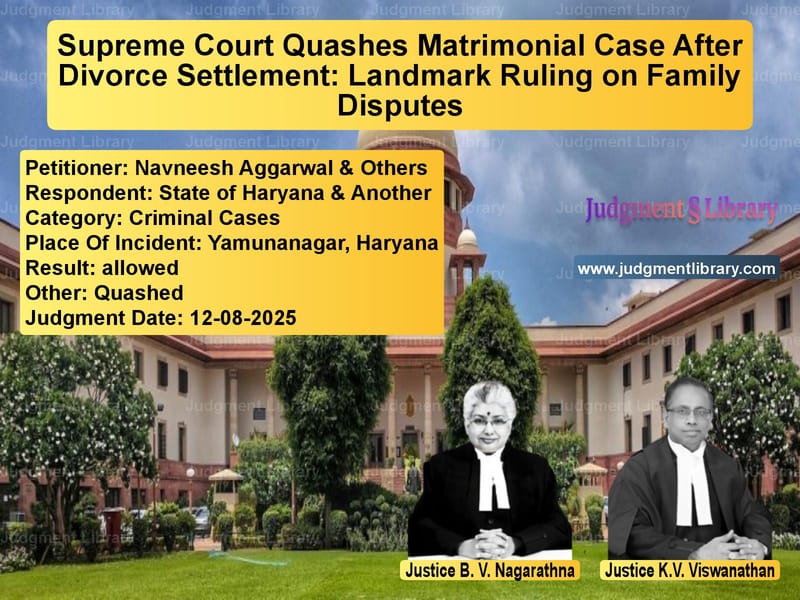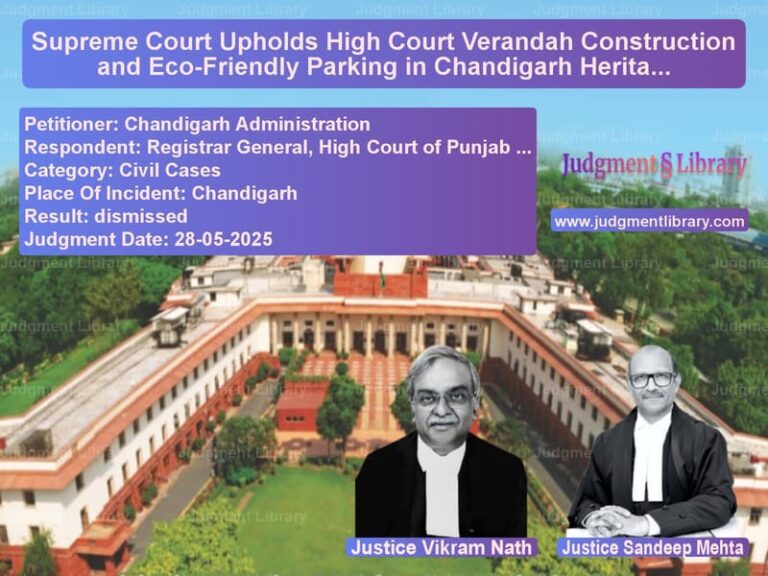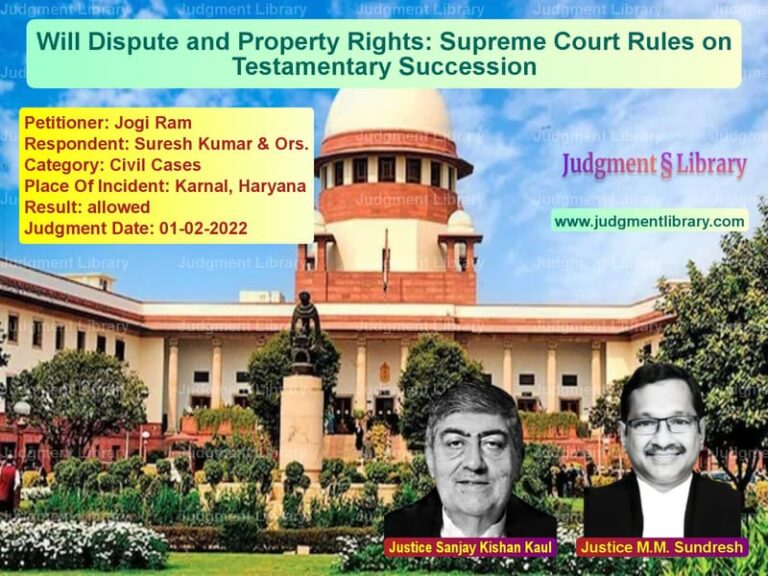Supreme Court Quashes Matrimonial Case After Divorce Settlement: Landmark Ruling on Family Disputes
In a significant judgment that balances the scales between justice and reconciliation, the Supreme Court of India has quashed criminal proceedings in a matrimonial dispute after the parties reached a divorce settlement. The case involving Navneesh Aggarwal and his family members against the State of Haryana highlights an important aspect of matrimonial litigation – when should criminal cases continue after the marital relationship has ended and the parties have moved on with their lives? The Supreme Court’s ruling provides crucial guidance on this sensitive issue, emphasizing that the continuation of criminal proceedings in settled matrimonial disputes can sometimes become an instrument of harassment rather than justice.
The Matrimonial Discord and Legal Proceedings
The case originated from the marriage between Navneesh Aggarwal (appellant No. 1) and respondent No. 2, which was solemnized on March 6, 2018. Due to differences that arose between them, the wife left the matrimonial home approximately ten months after the marriage, taking along her daughter from a previous marriage. This separation led to multiple legal cases being filed by both parties against each other. Among these was FIR No. 67 of 2019, registered on May 15, 2019, at Police Station Radaur, District Yamunanagar, Haryana, against Navneesh Aggarwal and his parents (appellant Nos. 2 and 3) under Sections 323 (voluntarily causing hurt), 406 (criminal breach of trust), 498-A (cruelty to married woman), and 506 (criminal intimidation) of the Indian Penal Code. A chargesheet was filed in this case on November 7, 2019.
The turning point came when the parties decided to end their marital relationship amicably. On January 19, 2024, the concerned Family Court granted a decree of divorce by mutual consent. As part of this settlement, all pending proceedings that were filed by the wife were withdrawn. In these circumstances, the appellants approached the High Court seeking quashing of the FIR and all subsequent proceedings under Section 482 of the Code of Criminal Procedure. Importantly, the wife filed a reply stating that she had no objection to the quashing of the criminal proceedings. However, the High Court dismissed the application, noting that the case would not be fit for quashing as certain allegations regarding the victimization of the child had been sufficiently substantiated.
Read also: https://judgmentlibrary.com/supreme-court-quashes-dowry-case-against-father-in-law-after-divorce/
Arguments Before the Supreme Court
Before the Supreme Court, the appellants’ counsel made compelling arguments for quashing the criminal proceedings. He submitted that “having regard to the fact that both the parties have been since divorced by mutual consent and a compromise decree had been effectuated as well, no purpose would be served by the continuation of the prosecution of the criminal case as against the appellants herein.” He further emphasized that “the divorce decree has attained finality and further, respondent No. 2 had no objections to the quashing of the criminal proceedings and the child is also aware of the compromise having been reached by the parties.”
On the other hand, the counsel for the State of Haryana opposed these submissions, arguing that “the complaint is well-justified having regard to the acts and omissions of the appellants herein.” He particularly stressed that “there were specific allegations regarding the victimisation of the child by appellant No. 1 and as a result, this would not be a fit case to quash the ongoing criminal proceedings.”
The Supreme Court’s Legal Analysis
The Supreme Court bench comprising Justices B.V. Nagarathna and K.V. Viswanathan delved deep into the legal principles governing the quashing of criminal proceedings in matrimonial disputes. The Court referred to several landmark judgments that have shaped the jurisprudence in this area.
The Court first cited its recent judgment in Dara Lakshmi Narayana vs. State of Telangana (2025), which “clearly held that family members of the husband ought not to be unnecessarily roped into criminal proceedings arising out of matrimonial discord. The Court observed that it has become a recurring tendency to implicate every member of the husband’s family, irrespective of their role or actual involvement, merely because a dispute has arisen between the spouses. It was further held that where the allegations are bereft of specific particulars, and particularly where the relatives sought to be prosecuted are residing separately or have had no connection with the matrimonial home, allowing the prosecution to proceed would amount to an abuse of the process of law. The Court noted that criminal law is not to be deployed as an instrument of harassment and that judicial scrutiny must be exercised to guard against such misuse.”
The Court also referred to its judgments in Mala Kar vs. State Of Uttarakhand (2024) and Arun Jain vs. State of NCT of Delhi (2024), where it had quashed criminal proceedings arising from matrimonial discord after the couples had divorced. The Court had held in these cases “that in such a situation, to continue with criminal prosecution would amount to abuse of the process of law.”
Another significant precedent cited was Ramanatar vs. State of Madhya Pradesh (2022), where the Court, while considering quashing of proceedings under Section 482 of CrPC, “took into consideration the fact that there had been a settlement arrived at between the parties in the said case and therefore, exercising jurisdiction under Article 142 of the Constitution of India, the Court quashed the complaint, the FIR, and subsequent criminal proceedings against the accused therein.”
The Court’s Reasoning and Final Decision
The Supreme Court noted several crucial facts in the present case: that there had been a decree of divorce by mutual consent between the parties; that both appellants and respondent No. 2 had accepted the divorce decree which had attained finality; that a compromise decree in full and final settlement of all claims had been effectuated; that all other pending cases between the parties had been withdrawn; and most importantly, that respondent No. 2 had no objection to the quashing of the criminal proceedings.
The Court articulated its philosophy in such matters with clarity: “In the considered opinion of this Court, the power under Article 142 must be invoked to advance the cause of complete justice in matters of this nature. Once the marital relationship has ended in divorce and the parties have moved on in their lives individually, the continuation of criminal proceedings against family members, especially in the absence of specific and proximate allegations, serves no legitimate purpose. It only prolongs bitterness and burdens the criminal justice system with disputes that are no longer live. The law must be applied in a manner that balances the need to address genuine grievances with the equally important duty to prevent its misuse. In appropriate cases, the power to quash such proceedings is essential to uphold fairness and bring quietus to personal disputes that have run their course. The aforesaid facts noted above reflect that both parties are not interested in pursuing the criminal proceeding.”
The Court also referred to the three-judge bench decision in State of M.P. vs. Laxmi Narayan (2019), which had observed that while exercising power under Section 482 CrPC to quash criminal proceedings in respect of non-compoundable offences that are private in nature and do not have a serious impact on society, the court should consider the antecedents of the accused and their conduct. The Court found that the appellants did not fall within the scope of observations that would warrant declining their plea for quashing.
The judgment also cited Gian Singh vs. State of Punjab (2012), where the Court “observed that where the High Court quashes a criminal proceeding having regard to the fact that the dispute between the offender and the victim has been settled, although the offences are not compoundable, it does so as in its opinion, continuation of criminal proceedings will be an exercise in futility and justice in the case demands that the dispute between the parties is put to an end and peace is restored, securing the ends of justice being the ultimate guiding factor. In this regard, a specific reference was made to offences arising out of matrimony, particularly relating to dowry, etc. or a family dispute, where the wrong is basically to the victim but the offender and the victim have settled all disputes between them amicably, irrespective of the fact that such offences have not been made compoundable.”
Finally, the Court referred to Naushey Ali vs. State of U.P. (2025), where it was observed that “proceeding with the trial, when the parties have amicably resolved the dispute, would be futile and the ends of justice require that the settlement be given effect to by quashing the proceedings. It would be a grave abuse of process particularly when the dispute is settled and resolved.”
The Final Outcome
Based on this comprehensive legal analysis, the Supreme Court allowed the appeal and quashed the chargesheet dated November 7, 2019, as well as FIR No. 67 of 2019 and all subsequent criminal proceedings against the appellants. The Court set aside the High Court’s order dated August 1, 2024, holding that “the prosecution of the criminal case by respondent No. 2 herein is not as per her intention any longer. Moreover, the continuation of the criminal proceeding would only be an instance of harassment to the appellants having regard to the peculiar facts of the case. Further, no fruitful purpose would be served in the continuation of the court proceedings and taking it to its logical end.”
This judgment reinforces the principle that criminal law should not be used as a tool for harassment, especially in matrimonial disputes where the parties have already reached an amicable settlement and moved on with their lives. It strikes a balance between ensuring justice for genuine victims of matrimonial cruelty and preventing the misuse of legal provisions to perpetuate conflict after the underlying dispute has been resolved. The ruling serves as an important precedent for similar cases where criminal proceedings continue long after the matrimonial relationship has ended and the parties have settled their differences.
Petitioner Name: Navneesh Aggarwal & Others.Respondent Name: State of Haryana & Another.Judgment By: Justice B. V. Nagarathna, Justice K.V. Viswanathan.Place Of Incident: Yamunanagar, Haryana.Judgment Date: 12-08-2025.Result: allowed.
Don’t miss out on the full details! Download the complete judgment in PDF format below and gain valuable insights instantly!
Download Judgment: navneesh-aggarwal-&-vs-state-of-haryana-&-a-supreme-court-of-india-judgment-dated-12-08-2025.pdf
Directly Download Judgment: Directly download this Judgment
See all petitions in Dowry Cases
See all petitions in Domestic Violence
See all petitions in Mutual Consent Divorce
See all petitions in Judgment by B.V. Nagarathna
See all petitions in Judgment by K.V. Viswanathan
See all petitions in allowed
See all petitions in Quashed
See all petitions in supreme court of India judgments August 2025
See all petitions in 2025 judgments
See all posts in Criminal Cases Category
See all allowed petitions in Criminal Cases Category
See all Dismissed petitions in Criminal Cases Category
See all partially allowed petitions in Criminal Cases Category







